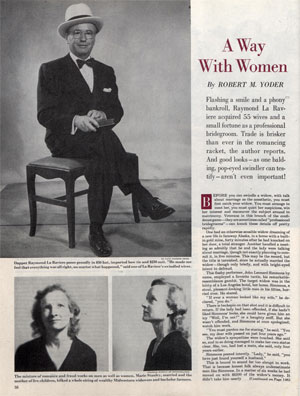Is it true, as W. C. Fields once said, that “you can’t cheat an honest man”?
A description of the top 10 con games seems to support the notion that dishonesty makes people vulnerable to con artists. In most of these operations, the victim’s greed, shame, or duplicity seem to make him an accomplice in his own swindling.
But if it’s true con artists can’t cheat honest men, why have they been able to cheat so many honest women? Why, for instance, was Raymond La Raviere so successful?
In the 1940s, La Raviere successfully played confidence games across the country without relying on his victims’ dishonesty. Their only fault, perhaps, was a desire for love and security.
He was arrested at a garage in 1948 when a police detective recognized him as a man wanted on a bigamy charge. Choosing to kill himself rather than face trial, La Raviere swallowed poison. While lying in a hospital, expecting to die, he made a full confession to a police officer. Over the past 10 years, he said, he had married 55 women and stolen $300,000 from them.
Unfortunately, the poison didn’t work. La Raviere was convicted and sentenced to eight years in jail.

As you’ll read in this article, running a romance scam was hard work. La Raviere had to keep moving from state to state, seeking wealthy single women. And, as you’ll read in the article, he had to stay continually in character, playing a wealthy bachelor from Alaska.
Once he had won a woman’s confidence — which never seemed to take long for him — La Raviere had to keep his latest fiancée from sharing the news with her relatives or friends. He swept his victims off their feet, into marriage, then away to the bank so they could open a joint account with her cash. After securing the money, he’d make a quick exit and was off to find a new mark.
Today, the business of wooing money out of women has become much easier and more profitable, thanks in part to the Internet and the $2 billion online dating industry.
Scam artists no longer need to marry to get at a victim’s money; they don’t even need to meet the victim. Instead, crooks can work in their bathrobe from the comfort of home, or in a cyber café in Malaysia. And they can work several victims at the same time.
Online romance scams have risen dramatically. In fact, the number of complaints doubled between 2013 and 2014, according to the Federal Trade Commission. Just between July and December of 2014, phony online admirers cheated Americans out of some $82 million — and these losses are probably underreported.
Of course, women aren’t the only victims — crime has always been an equal opportunity employer. But judging from stories reported in the media, the majority of the victims have been women.
Which raises the question: Are women, by nature, more easily fooled?
According to researchers at the University of California, Berkeley, and University of Pennsylvania, women aren’t more gullible. But they are more likely to be lied to.
The researchers came to this conclusion while observing MBA students practicing real-estate negotiations. Researchers found both men and women were more likely to lie to a buyer who was female than to a male.
The students told researchers they didn’t think women were more gullible, but they expected men would be more experienced negotiators and better able to spot a lie.
Believing that women had less skill in recognizing lies encouraged students to make false claims, the researchers concluded. “As a result, women are deceived more often than men.”
Which raises a second question. If women are more likely to be deceived, are men more likely to be deceptive? Here the research is less equivocal. Several studies agree that men lie more often than women: 50 percent more according to one British study.
According to these studies, the men don’t lie constantly; they appear to save their falsehoods for what they consider important matters. They are also more likely to justify unethical behavior and ignore the moral consequences of their actions.
While pondering the scope of male mendacity, you might want to know that Raymond La Raviere’s bigamy record was eventually shattered in 1983.
In that year, Giovanni Vigliotto, aka Nikolai Peruskov, aka Fred Jipp, was sentenced to 34 years for fraud and bigamy. In his testimony to the court, he confessed that he’d married and defrauded 105 women.
But given what we’ve been saying about men, should you believe him?
Become a Saturday Evening Post member and enjoy unlimited access. Subscribe now



